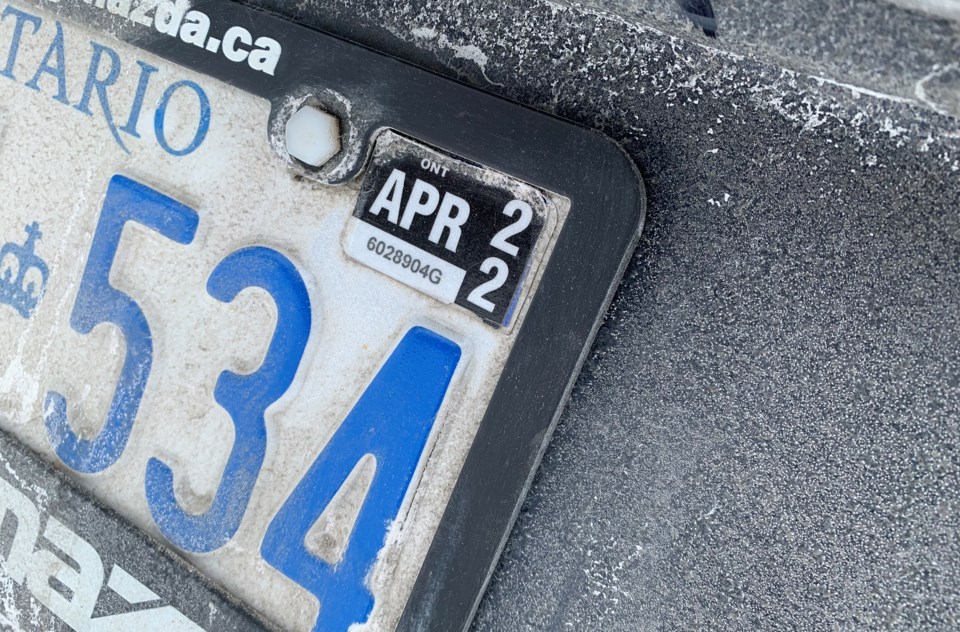OPP say people are receiving text and email messages advising them of the Ministry of Transportation validation permit refund.
It asks that you click on a link to claim your refund.
Since the announcement of the licence plate refund, some residents have received a text message phishing scam with the false link to get their $60 refund. The link appears as though it is legit as "ServiceOntario" appears in the text.
Do not click on the link say police, the MTO does not send text or email messages to the public.
ServiceOntario will not be contacting anyone to provide a link to the refund. To check if you qualify for a refund, visit the Service Ontario website at: www.ontario.ca. The cheques are scheduled to be mailed out in late March and through April.
"Never give out any personal, credit or banking information to anyone over the phone, by letter, email, fax or any other means of communication. Never provide anyone your Social Insurance Number over the phone," say police.
"Any legitimate agency will never request payment by Interac e-transfer, online currency such as bitcoin, pre-paid credit cards or pre-paid gift cards such as Google Play, iTunes, Vanilla, etc. Scammers will ask to purchase large denomination gift cards as a form of payment."
Members of the Temiskaming Detachment of the Ontario Provincial Police (OPP) would like to advise the public that March is Fraud Prevention Month. The OPP would like to remind everyone that you have to do your homework prior to giving any personal information, money or sending prepaid ITunes cards to anyone. Here are some recent scams reported in the Temiskaming area; however we have to remember that new ones are created every day.
Cryptocurrency Scam
This scam involves sending money through a cryptocurrency, such as Bitcoin. Cryptocurrencies are not regulated in Canada and operate independently from banks.
While a substantial number of businesses are accepting the wide range of cryptocurrencies available, there is no protection from fraud when using them as a form of payment.
How to Protect Yourself:
- Beware of requests demanding a transfer of funds using Bitcoin or any other cryptocurrency
- Be wary of offers to invest in cryptocurrency
- Keep in mind that government agencies will never request a payment in the form of cryptocurrencies
- Do not send any funds or deposit into a bitcoin wallet via bitcoin automated teller machine (ATM)
Romance Scam
The criminals seek potential victims online, generally single or recently unattached people. Usually this form of mass marketing fraud occurs through singles and dating-related 'meet' websites, social media platforms, or e-mail blasts. In some cases, prolonged interaction with individuals has cost some victims tens of thousands of dollars before the so-called 'relationship' ends, usually without ever meeting in person. Although 95 per cent of all types of fraud are not reported, romance scams cause victims severe financial hardship and personal embarrassment, which inhibits their decision to report the crime.
Tips to Avoid Being a Victim of a Romance / Dating Scam include:
- Don't give out any personal information in an email or when you are chatting online. Educate yourself. Check the person's name, the company name, and the addresses used
- Ask yourself - 'Would someone I have never met really declare their love for me after only a few letters or emails?' If the answer is no, report it to police
- Never send money, or give personal credit card or online account details to anyone you do not know and trust. A request to send money to a foreign country to someone you have never personally met should be a red flag
- Checking website addresses carefully. Scammers often set up fake websites with addresses that are very similar to legitimate dating websites
LEARN MORE
If you suspect you may be the victim of fraud or have been tricked into giving personal or financial information, contact your local OPP detachment at 1-888-310-1122, the Canadian Anti-Fraud Centre at 1-888-495-8501 or visit their website at: www.antifraudcentre.ca.
An astounding number of frauds go unreported for a variety of reasons. Remember that these fraudsters are PROFESSIONALS at their craft. The more we know, the more we can do. Please report frauds! #FPM22022 #kNOwfraud Canadian Anti-Fraud Centre #SuperiorEastOPP^tt pic.twitter.com/PELYUrTDT2
— OPP North East Region (@OPP_NER) March 3, 2022



